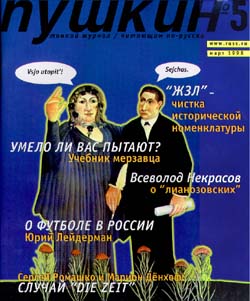
PUSHKIN #5. SUMMARY
While reviewing the book entitled Philosophical Pragmatism of Richard Rorty and the Russian Context, Andrey Paramonov explains to the readers not only the philosophical strategy of recontextualization or re-writing of Richard Rorty, but also undertakes an analysis of the Russian authors of the book with collected articles from this point of view.
Vitim Kruglikov studies semantical, grammatical, and corporeal and affective features of the particle vot in the practice of the Russian everyday speech.
The article discussing the German weekly Die Zeit follows the history and troubles of the coming into being of one of the largest German periodicals.
"Why? Why do our soccer players play as badly as all that?!" Having thoroughly read the official booklet A Centenary of the Russian Soccer, Yury Leiderman offers an explanation of his own which is far from current versions.
"I would like to see this person, to see him with my own eyes, as a living man, not as a remarkable mummy of this kind", writes Alexandra Belkina, while sarcastically commenting on the volumes of featured biographies published in 1997.
Igor Pilshchikov tells the readers about the literary road of Avraam-Uria Kovner, a journalist, a criticist and a brilliant polemicist, who used to argue with Dostoyevsky and Rozanov on a par.
"Yesterday they were butchers, whereas today they are trying to do the same things in a hope that tomorrow "the yesterday" will return. Reflections of Valeria Novodvorskaya over the proliferative activity in the field of memoirs writing by the former KGB officers, including Roman Ronin's An Intelligence Office of One's Own, a book published in Minsk which does not resemble memoirs at all.
"I had a wish to rediscover these books for myself, to experience once again the delight, the anger, and the trembling produced by them". This wish has roused the forty-five-year movie criticist David Denby to return to the campus to listen at the Columbia University to the courses of lectures on classical literature and philosophy.
Georgy Cherny reviews a new recipe of correcting the public morals offered in the book by A.Myasoyedov On Boorishness and Bad Manners in the Russian Life.
He used to be on the payroll of the Russian Service of the BBC in London. He wrote under the pseudonym of Robert David in the Russian opposition newspapers in the early nineties. He had received in the Israeli mass media a stable nickname of "favorite enemy"... Israel Shamir, a literature expert, an author and a translator, tells his story in a talk with the journalist Alexander Lyusy.
Vsevolod Nekrasov tells about the poets and artists of the Lianozovo school. What did they look like forty years ago? What has become to them nowadays? And why are they as if absent now?
Victor Toporov writes about the Leftism in the literature (which, in the author's opinion, is opposed to the literary mainstream) and the most remarkable writers of this trend, including V.Sorokin, E.Limonov, N.Medvedeva, and I.Yarkevich.
Alexander Yakimovich, discussing the sexual mechanisms of avant-guarde, comes to a curious conclusion that the avant-guarde adherents "had an access to the feast tables and beds of sin destined for the others, but, <...> just like ascetics and virgins in principle, they had learnt to get satisfaction from non-realization of the possible".
In his review of the recently published book by the German author Monika Maron, Vladimir Malakhov expresses regret because of the absence of any serious work on trying to understand her experiences in her texts. The author's views remain unchanged even when they seem to be necessarily reconsidered.
Dmitry Petrov in his account of Russian extreme right-wing publications warns that their overall circulation hits half a million. This fact alone should foreground and prioritize the problem of rightist extremism in Russia. Right-wing extremist ideologists are diligently mastering the cutting-edge technologies of brainwashing while right-wing extremist leaders are craving for power.
"Conflict as a category is related to pain. Pain is basically perceived as a signal of danger. Zero conflict means zero signal," argues Pavel Kalitnikov. A space devoid of conflict provides quite a comfortable niche for a man of letters, whose ultimate aim is as simple as to "hit the top 100". But indeed, it proves fatal for literature, stripping it of lustre and personality, averaging it out, dehumanizing it.
What happens when people get determined to settle a score with history? Why does nobody seem to know how to deal with his own history? "The Haunted Land" by Tina Rozenberg, reviewed by Mark Pechersky, features the prodigal son, who is not, however, looking for a way home; in fact he hardly remembers that he ever had one."
|

